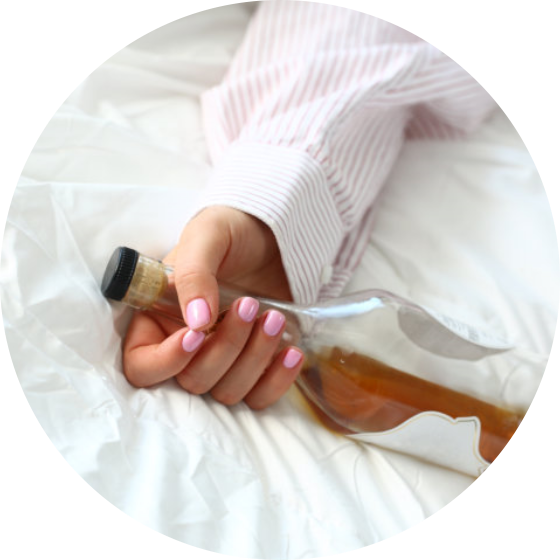Alcohol and Sleep
Last updated: December 2020
Home > Information & Support > Adults > Sleep Hub >Alcohol is a commonly used sleep aid with many believing that alcohol helps them to fall asleep and sleep better throughout the night.
Too much alcohol, especially late at night, can play havoc with sleep patterns – losing valuable sleep and disrupting vital brain functions without knowing boozing is the cause. Waking up deprived of the vital sleep your body needs will leave you feeling drained and, if experienced night after night, can seriously affect your health and wellbeing.
Alcohol can be a headache in various ways, including its impact on sleep:

- You lose quality sleep… While alcohol may help you fall asleep initially it will interrupt your sleep later on in the night causing lots of brief awakenings (which you won’t remember) which is why you feel you haven’t slept well the next morning. It also robs you of one of the most satisfying types of sleep, where dreams occur.
- Snoring… Large quantities of alcohol aids poor breathing leading to snoring. It relaxes your jaw and throat muscles which collapse into the airway, restricting airflow and causing snoring.
- Too many loo breaks… Alcohol stops the brain from releasing an important chemical, called vasopressin, which normally regulates the amount of water in your body. This dehydrates the body and sends you running to the loo all night!
- Dehydration… Booze encourages too much water to be flushed out of your body which will dehydrate you, putting your body under strain and contributing to a headache that can stop you sleeping.
- Your brain can’t hurt! However, while you may feel like your hangover headache is caused by your brain hurting, your brain actually can’t feel pain because it has no pain receptors. In fact, while the headache may feel as if the brain is banging against the skull, the pain is actually coming from the inner lining of the skull and the blood vessels.
Avoid replacing alcohol with other chemicals like sleeping tablets in order to fall asleep at night. Most chemically active substances and medications with hypnotic actions can lead to dependence if used habitually and also generate various undesirable side effects, some of which can have potentially harmful consequences.
If you use alcohol as a way of unwinding from a stressful day try alternative methods such as taking a warm bath, reading a book, meditating or performing relaxation exercises.
